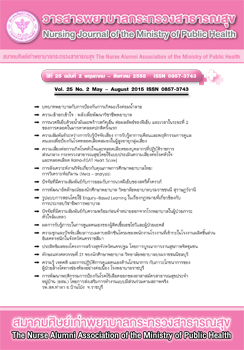ความเข้าอกเข้าใจ: พลังเพื่อพัฒนาวิชาชีพพยาบาล
Main Article Content
Abstract
บทคัดย่อ
ความเข้าอกเข้าใจเป็นมิติด้านอารมณ์และสังคมที่เป็นพื้นฐานของปฏิสัมพันธ์และความสัมพันธ์ของมนุษย์ เป็นความสามารถในการรับรู้ต่อความรู้สึก การคิด การกระทำ และเข้าใจผู้อื่นด้วยความสอดคล้องกลมกลืน พื้นฐานของความเข้าอกเข้าใจเป็นสิ่งที่เอื้อโดยธรรมชาติจากสมองของมนุษย์ เพื่อส่งเสริมให้มนุษย์เกื้อกูลซึ่งกันและกัน และเชื่อว่าเป็นสิ่งที่สร้างและพัฒนาได้
ความเข้าอกเข้าใจเป็นคุณลักษณะที่ประกอบไปด้วยหลายองค์ประกอบทั้งด้าน อารมณ์ คุณธรรม ความคิด และพฤติกรรม การฝึกทักษะความเข้าอกเข้าใจ ทำได้โดยการใช้ข้อมูลเพื่อช่วยจินตนาการภาพชีวิตของผู้ป่วย การเข้าใจตัวตนและการดำรงอยู่ของบุคคล การฟังอย่างลึกซึ้ง และการฝึกสะท้อนคิดเพื่อตระหนักรู้ในตนเองความเข้าอกเข้าใจเป็นคุณลักษณะสำคัญที่เพิ่มระดับคุณภาพของการปฏิบัติงานและศาสตร์ของวิชาชีพ
Empathy: The Power for Developing Nursing Profession
Jinjutha Chaisena Dallas*
Abstract
Empathy is a social-affective dimension at the basis of human interaction and relationships. To be empathetic harmoniously, a person needs to be able to perceive others emotions, thoughts, and actions to understand their perspective. The foundation of empathy is provided by brain function in order to support human caring. Rather, empathy could be able to construct and develop.
Empathic components consist of emotive, moral, cognitive, and behavioral domains. To expand empathic skills, nurses might use knowledge informed imagery, knowing existential being, deep listening and practice of reflectivity for self-awareness. Faithfully, empathic understanding is a crucial value for enhancing the quality of nursing practice and nursing sciences.
*Instructor in Mental Health and Psychiatric Nursing Department, PhD in Nursing Science, Faculty of Nursing, Burapha University
Article Details
บทความและรายงานวิจัยในวารสารพยาบาลกระทรวงสาธารณสุข เป็นความคิดเห็นของ ผู้เขียน มิใช่ของคณะผู้จัดทำ และมิใช่ความรับผิดชอบของสมาคมศิษย์เก่าพยาบาลกระทรวงสาธารณสุข ซึ่งสามารถนำไปอ้างอิงได้
